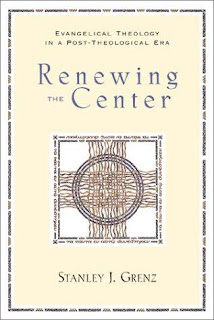 Renewing the Center by the late Baptist theologian Stanley Grenz is a worthy attempt to engage positively from a Christian perspective with the grab bag of ideas called postmodernism. I found it an interesting read, and recommend it to anyone with an interest in theology and philosophy. Grenz's love of Jesus and his church is evident, and keeps the book from being merely an exercise in academic speculation. What if, instead of seeing postmodernism as a threat to Christianity, specifically evangelical Christianity, we saw it as an opportunity? Grenz sees opportunities where others see only danger. We need more optimistic books like this.
Renewing the Center by the late Baptist theologian Stanley Grenz is a worthy attempt to engage positively from a Christian perspective with the grab bag of ideas called postmodernism. I found it an interesting read, and recommend it to anyone with an interest in theology and philosophy. Grenz's love of Jesus and his church is evident, and keeps the book from being merely an exercise in academic speculation. What if, instead of seeing postmodernism as a threat to Christianity, specifically evangelical Christianity, we saw it as an opportunity? Grenz sees opportunities where others see only danger. We need more optimistic books like this.
One of the places where the author sees renewed opportunity to transcend entrenched paradigms is in the perennial conflict between faith and science. For several centuries the primacy of science and the privileging of the scientific method was unchallenged. Then along came thinkers like Werner Heisenberg and Thomas Kuhn whose work led to a growing realization that empirical science ala John Locke isn't necessarily the most reliable method of inquiry, and furthermore that the scientific enterprise itself requires personal faith commitments on the part of its practitioners. In Grenz's words the rise of a "post-empirical philosophy of science" has led to a surprising realization that "scientists resemble theologians."
Some quotes from Chapter 7 "Theology and Science after the Demise of Realism".
Armed with the scientific method, modern scientists busied themselves with the task of unlocking the mysteries of the universe and, in the process, celebrated discovery after discovery. Yet even as science was enjoying its greatest triumphs, certain aspects of the modern scientific worldview were shaken from within. The most far-reaching internal challenge came from physics, the discipline that had hitherto provided the firmest foundation for the modern scientific edifice. Developments in the early twentieth century—such as quantum theory, relativity theory, and Heisenberg's uncertainty principle—undermined not only the mechanistic model of the world but also earlier assumptions about scientific objectivity and certitude, together with the ability of science to delve into the "deepest secrets" of creation or to gain unambiguous knowledge of the universe. (p. 244)
The work of Kuhn [Thomas Kuhn author of the 1962 book The Structure of Scientific Revolutions] and others has resulted in an increased recognition that the foundations of scientific discourse, and hence scientific "truth," are in some sense communally determined. Science is not merely the neutral observation of data. (p. 245)
Yet in the emerging post-empirical understanding, science no longer looms as a haven of objectivity in a sea of cultural relativity. . . . In short, post-empirical philosophy of science has led to a "chastened" view of science. (p. 247)
In my view this is a positive development in and of itself. The godlike status accorded to science led to a wholesale attempt to privatize faith and push the search for theological knowledge to the margins, or into a different category of "truth" -- as if the claims of the gospel aren't either true or false in the same way that 2+2=4 is true or false. Also, the attempt to make the scientific method applicable to all disciplines had led many theologians to imagine that it could be appropriated to systematically discover theological truth from the pages of Scripture much like a scientist in a laboratory. Disciplines such as systematic theology and Systematic Theologies have their place (I consult Berkhof's regularly!), but Grenz and the post-empirical thinkers remind us that truth is best pursued in community, and the result is often not as neat and predictable as we expect.
In a way the postmodern thinkers are asking the same question Pontius Pilate posed to Jesus: "What is truth?" Contra those who would throw the baby of truth out with the bathwater of modernism, Christians must continue to insist that objective truth and reality exist, and are fully knowable in Christ: "in whom are hidden all the treasures of wisdom and knowledge." (Col. 2:3)

No comments:
Post a Comment